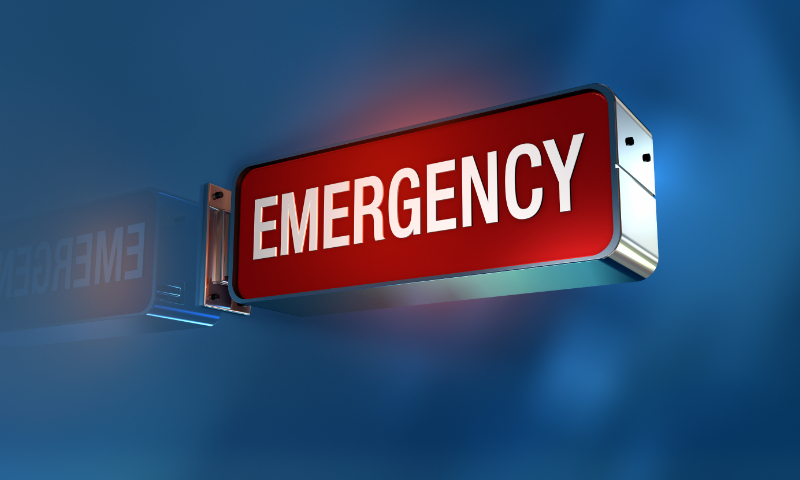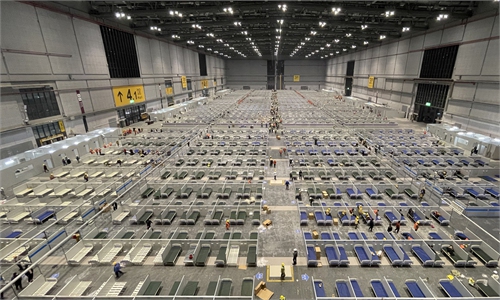Hospital, local health commission punished for child's death; clues of denied or delayed treatment for COVID-19 test not found

Photo: VCG
A hospital, its administration staff, a doctor and the head of the local health commission in East China's Jiangsu Province were punished for the death of a child after a medical emergency. Investigations revealed that the hospital did not refuse or delay the treatment due to the lack of negative test for COVID-19, in contrast to widely circulating rumors.
After accidentally swallowing shelled pumpkin seeds, a 17-month-old child was sent to a hospital in Suining county in Jiangsu Province, on the evening of April 29, and later taken to a hospital in Xuzhou city. However, the baby boy died about eight hours later after failed resuscitation.
A netizen who claimed to be the child's relative posted a video on Douyin, the Chinese version of TikTok, accusing the Suining People's Hospital. According to the woman, the hospital required patients to receive treatment only after the results of the nucleic acid test were available and refused to provide any treatment to the child while waiting for the results, which eventually led to the child's death after being referred to the hospital. This widely circulated claim was confirmed as false information after an investigation.
The report of an investigation by various departments in Xuzhou and Suining published on Thursday showed that the doctor, who admitted the baby surnamed Shi into Suining People's Hospital judged that there was a foreign body in his trachea after the initial examination and gave him first aid such as oxygen intake. Later that evening, the hospital told the family that they should take the child to a bigger hospital in the city for further medical treatment because of the insufficient capacity of the medical center and issued relevant documents.
However, the family did not make a decision in time because the child's parents were not present. Later, when Shi's parents arrived at the hospital, the doctor informed them of the child's condition and went on to treat other patients, according to the investigation.
Since then, the doctor called the child's father six times to inquire about his condition and to urge a transfer to the hospital as soon as possible. The Suining People's Hospital also contacted the Xuzhou New Health Hospital for the transfer of the child.
In the early morning of April 30, Shi's mother called the 120 emergency number for an ambulance and took Shi and his family to the resuscitation room of the Xuzhou New Health Hospital. The doctor on duty examined the baby and performed emergency medical measures.
Shi suddenly developed respiratory arrest and staff immediately applied CPR and other resuscitation measures and organized expert consultations. The child was declared dead at 4:56 am.
The investigation results showed that the child's treatment was not denied or delayed because he did not have a negative result for COVID-19. Instead, the Suining People's Hospital treated Shi and issued transfer documentation at a time when the child and his family did not have the test results.
During treatment at Suining People's Hospital, medical staff took the nucleic acid samples of the baby and the family member accompanying him. Neither hospital requested the test results before treatment.
Nonetheless, the investigation team found that the Suining People's Hospital failed to follow up on the child's treatment in a timely manner and did not inform the family of his condition and the possible serious consequences. The Suining People's Hospital also failed to adequately inform the Xuzhou New Health Hospital of the patient's detailed condition after issuing the transfer documents.
The Suining People's Hospital was warned for this incident and will be downgraded. The doctor who admitted the child was also suspended from his practice and will be further investigated.
Two top administration staff of the hospital and its Party secretary and director were removed from their positions. The Party secretary of the Suining county's health commission also received a warning from the Party.
Xuzhou city and Suining county vowed to resolutely avoid the recurrence of similar incidents.
Access to care for non-COVID patients during an outbreak has been an issue of public concern for some time.
Previously, there were cases in Shanghai and Xi'an where patients did not have nucleic acid test results and were delayed access to medical care, leading to serious consequences. The authorities have then requested that every effort be made to guarantee access to care for non-COVID patients.
The most important thing in this official announcement is the confirmation that the delay in treatment due to nucleic acid testing is not true, which is a timely response to public concerns, Zhang Yiwu, professor at Peking University, told the Global Times.
After the announcement, some netizens noted the punishment for the hospital and doctors was too harsh, pointing out that they did not violate the process or delay treatment.
With the high concern of the public, it was inevitable that hospitals would be punished because of genuine negligence in their handling, Zhang said, adding that "various departments in Xuzhou and Suining are also under relatively high public pressure. "
As for the strict penalties imposed on the hospital and the doctors, more detailed explanations may come after additional details are exposed by the local government or the media, Zhang said.
And as for the previous rumors spread widely on the internet, Zhang noted that the public's concern and sensitivity had clearly been exploited.
"For families who have just lost a child, grief may cause them to exaggerate emotions and facts. Yet, fabricating false information to attract the attention of public opinion is clearly wrong and inappropriate," Zhang remarked.
On social media, there have also been many calls for investigation into the publication of false information.
Observers noted that during the epidemic, especially now when the public is extremely sensitive about access to regular health care, cities will further ensure the treatment of non-COVID patients and those who disseminate false information will be punished.

